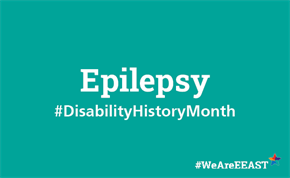
This Disability History Month, the first condition we’re looking at is epilepsy.
What is epilepsy?
Epilepsy is often a lifelong neurological condition that causes seizures. Seizures are bursts of electrical activity in the brain, temporarily impacting how it works. This can cause a whole host of symptoms, depending on what area of the brain is affected.
Did you know there are more than one type of seizure? Some seizures cause the body to jerk and shake, which is how many of us would normally picture a seizure.
There are others that cause problems such as loss of awareness or unusual sensations. You can find out about the different types of seizures and their symptoms via the NHS website.
Living with epilepsy
Seizures can be a lifelong condition and can happen randomly or they can be triggered by different causes such as stress or a lack of sleep, among others.
Looking out for each other’s wellbeing and supporting colleagues is so important – just because someone’s disability may not be visible, doesn’t mean they don’t need help or adjustments at work.
Epilepsy as a disability
If you have epilepsy, you will more than likely be classed as disabled under the Equality Act, protecting you from disability discrimination, if:
The Equality Act is also likely to protect you from discrimination if you’ve had epilepsy in the past.
More information can be found at Epilepsy Action.
Past, present, future
For many years, people didn’t understand what epilepsy was and those living with the condition were often treated as ‘different’.
Although life is still difficult for those who suffer from the condition, there have been many positive changes for the better, including in the law, public awareness, social attitudes, medical practices, and knowledge.
There are many treatment options available now that once didn’t exist, such as medication, surgeries, electrical devices, special diets, and even medical detection dogs. Many of which can help reduce the number of seizures or stop them completely.
As with all disabilities, work is continuing to progress to ensure more people understand epilepsy as a debilitating illness, and Disability History Month is a great opportunity to raise awareness here at EEAST.
Do you suffer from epilepsy? Get in touch with your story, we would love to hear from you!
Published 18th November 2022